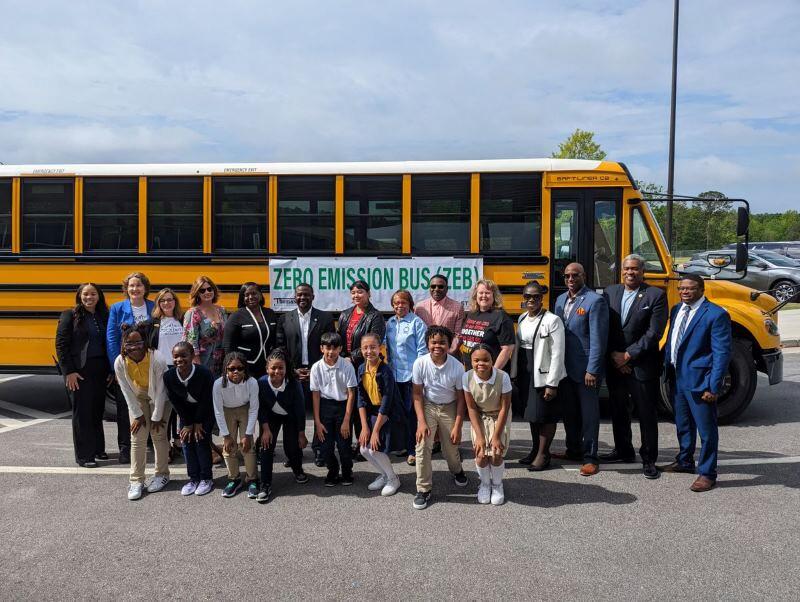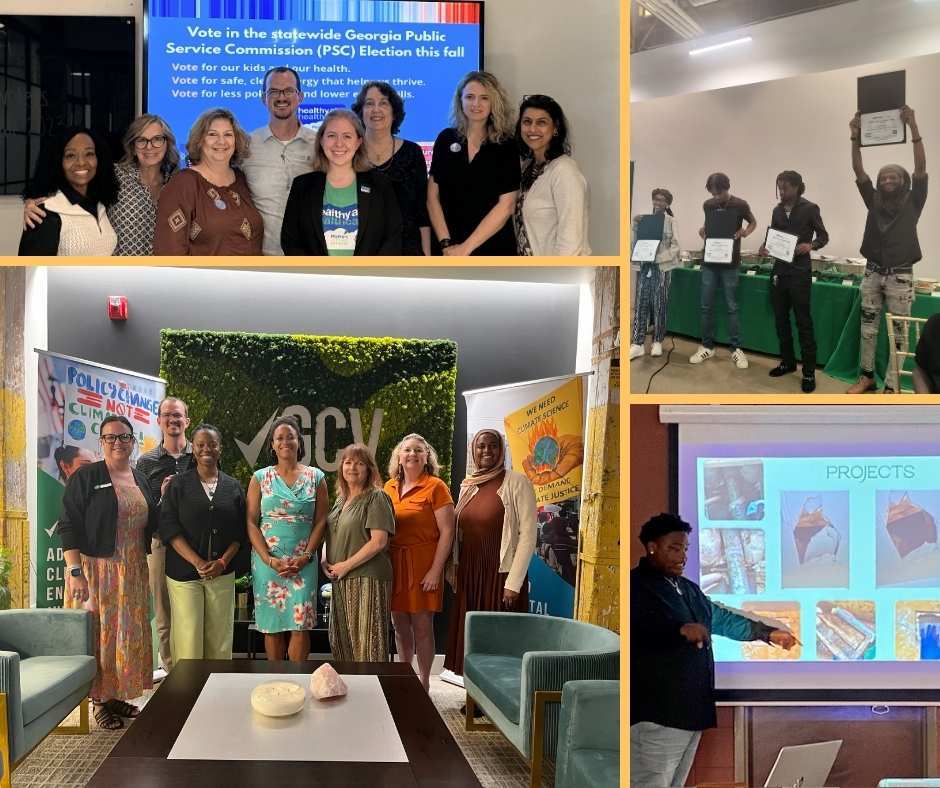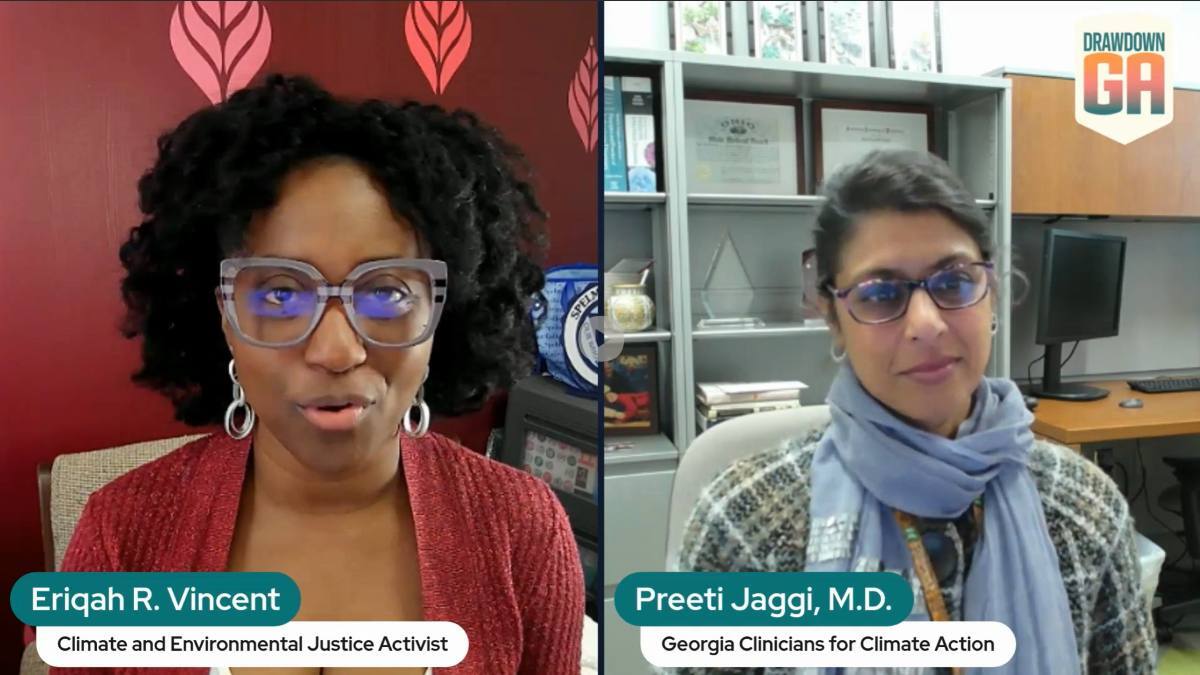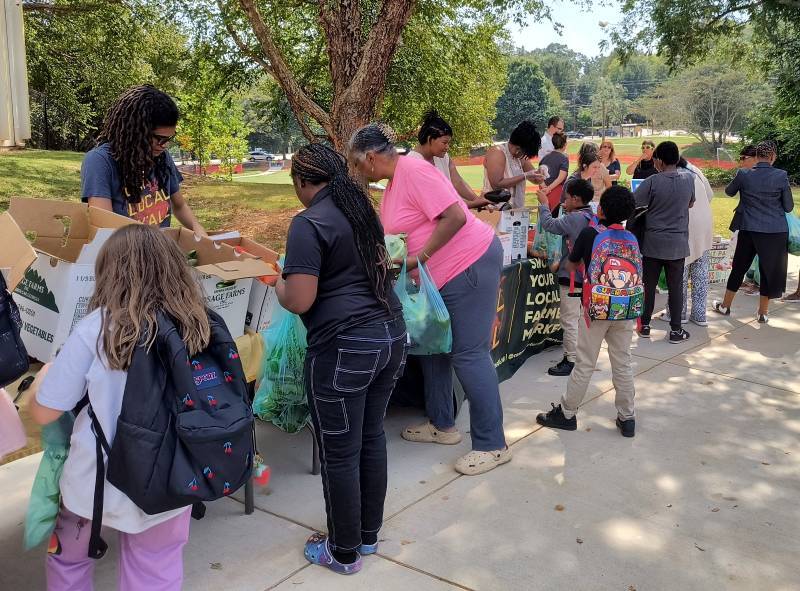Electrifying transportation in Georgia is a powerful climate solution, and the benefits of upgrading to electric school buses go beyond carbon. The transition to electric buses supports the local economy and can positively impact our kids' health, too.
How Electric School Buses are Reducing Greenhouse Gas Emissions in Georgia
We recently spoke with representatives from Climate Solutions & Equity grant recipients Mothers & Others for Clean Air about their partnership with the Georgia State Medical Association and Georgia Clinicians for Climate Action to advance the transition to electric school buses in Georgia’s school districts.

Read on to learn more about the exciting work this grant is funding, and how these grant partners are taking action to support schools, reduce greenhouse gas emissions, and improve local air quality across the state.
Tell us about the work that Mothers & Others for Clean Air (MOCA) does in the community.
MOCA’s mission is to protect children’s health by reducing the impacts of air pollution and climate change throughout Georgia. We were founded by Laura Turner Seydel and Stephanie Blank nearly 20 years ago out of concern for the fact that Georgia was the leader in childhood asthma because of our traffic pollution.
Since then, we have been advocating for policies and behavior change that will reduce the amount of polluted air our children breathe. We educate the public as well as state and local officials; advocate for systemic changes to improve air quality and mitigate climate change; and connect Georgia communities to this work.
We are members of several climate and environmental justice coalitions and work in collaboration with them to inform and engage local healthcare professionals, elected officials, school district leaders, maternal and children’s health advocates, and anyone who will listen about how the air we breathe is connected to our health and wellbeing.
Congratulations on receiving a 2024-2025 Climate Solutions & Equity grant. Tell us about the projects this grant is funding.
The Climate Solutions & Equity grant supports a coalition of three organizations–MOCA, Georgia State Medical Association (GSMA), and Georgia Clinicians for Climate Action (GaCCA). Together, we are coordinating a “Healthy Air Is Healthcare” campaign to teach healthcare professionals to advocate for school districts to transition from health-harming, dirty, diesel school buses to clean, quiet, electric school buses.
Healthcare professionals are increasingly concerned about the effects of air pollution and climate change, yet they don’t often use their status as trusted members of the community to create change. We are training physicians to amplify a message about the health impacts of diesel exhaust and other air pollution by meeting with decision-makers in their communities.

Children do not get to choose the type of bus they ride; the school district does. Right now, districts have access to an unprecedented amount of federal funding through the Inflation Reduction Act. We are working to equip school district leaders with the knowledge, conviction, and support to pursue these funds and ensure that Georgia’s children and communities can benefit from these funding opportunities.
How did MOCA come to partner with Georgia Clinicians for Climate Action and the Georgia State Medical Association for this project?
MOCA’s Executive Director Tanya Coventry-Strader, and Medical Advisor Dr. Anne Mellinger-Birdsong, together with Dr. Preeti Jaggi with Georgia Clinicians for Climate Action, participated in a year-long Climate Health Organizing Fellowship through Harvard Medical School and Cambridge Health Alliance.
As Fellows, we learned how to organize health professionals to support climate-friendly policy using the methods Professor Marshall Ganz used during President Obama’s campaign. We liked the project we worked on as a group so much that we applied for the Drawdown Georgia Climate Solutions & Equity Grant in the hope that we could continue this work and increase our efforts.
We had worked with Dr. Kimberly Williams of GSMA in the past and asked her if she would join us, which she did. GSMA is a wonderful partner because they have members across the state of Georgia working in communities and seeing the effects of air pollution and climate change in their daily practice.
Why focus on electric school buses as a climate solution?
Drawdown Georgia’s Climate Solutions framework includes electrifying vehicles, which account for the majority (41%) of the state’s greenhouse gas emissions. School buses contribute an outsized amount to Georgia’s emissions. Replacing one diesel school bus with an electric bus is estimated to eliminate 54,000 pounds of CO2 annually.
Nearly one million children attend K-12 public schools in Georgia, and 55% of those children ride buses to school. Georgia’s aging diesel school bus fleets log 683,000 miles daily across 180 districts and result in children breathing in 4 to 15 times more diesel pollution inside the buses than the general public.
Students may spend only 10% of their day riding diesel school buses to and from school, but these buses can contribute up to 33% of a student’s air pollution exposure. Diesel exhaust contains more than 40 toxic air contaminants that are known to cause cancer. Exposure to these fumes can cause respiratory illness, chronic respiratory inflammation, and can trigger asthma attacks. In addition to harming children’s health, diesel exhaust contributes to reduced academic test scores and lower school attendance.
The age of Georgia’s school buses exacerbates these problems. Nearly 30% of school bus fleets are over 15 years old, which means they are the most polluting models. Children riding inside older diesel school buses breathe 5-15% more toxic diesel emissions than a child riding a car on the same road because the bus crankshaft leaks exhaust fumes directly into the bus.
Electric school buses are the preferred solution for transporting Georgia’s students to and from school. Electric buses are the only option that produces zero tailpipe emissions, meaning children riding in electric school buses are not exposed to health-harming exhaust inside the bus or outside the bus. The lifetime emissions of an electric school bus are estimated to be less than half of the lifetime emissions of diesel or propane buses.
How does this project connect to issues of equity and climate justice in Georgia?
Underserved urban and rural communities still suffer from structural racism; communities and schools situated near transportation hubs, major roadways, factories, and industrial sites are overburdened by air pollution and climate change. Unfortunately, these are the same communities that don’t have the tax base to raise incremental funds for schools, and many struggle to access complicated federal grants due to a lack of resources.
Our campaign is focused on bridging knowledge and resource gaps between school district leaders, and on providing the justification, technical needs, and grant writing support they need to access available funds. We are centering our mobilization efforts on Georgia’s priority districts, which were identified by the EPA because of their high need, lower income, and/or rural location.
Twenty school districts have received federal grants and rebates for electric school buses, and many more have applied. However, there are over 105 priority school districts identified by the EPA in 2024, many of whom have not yet applied. By focusing primarily on districts that have not successfully secured federal funding for the transition to electric buses, we are using our coalition’s assets to help more priority districts take advantage of this unprecedented opportunity.
What does success look like in your work?
We envision a day when all of Georgia’s children ride to school on a clean, quiet electric bus and are no longer negatively impacted by the noise pollution of diesel engines and the smelly exhaust in the cabins of the buses triggering asthma, headaches, and other health impacts.

This is not a short-term vision. School transportation has been chronically underfunded in Georgia and many rural and underserved communities simply cannot afford to replace diesel buses with electric buses unless there is federal and state policy that supports their transition efforts. Our main goal is to engage healthcare professionals, parents, school staff, and especially school district leaders to help them understand the health and climate benefits of transitioning to electric buses.
Everyone wants their children to grow up strong and healthy. If we can focus on that as a common goal, and get different stakeholder groups working together, we will succeed.
We will succeed if district leaders decide to use the power they have to support the transition. We will succeed if utility providers prioritize the infrastructure and transmission needs of districts adopting school buses. We will succeed if manufacturers of electric buses deliver buses quickly to districts.
We will succeed if our state and federal governments continue to support this transition, even after the current IRA funding sunsets. We will succeed, ultimately, if every student– no matter how far they live from their school or how under-resourced their district might be–, only knows the experience of a quiet, clean ride to school on an electric school bus.
How can people follow the work you do and/or get involved in your projects?
People can sign up to receive our monthly campaign newsletter, which includes the latest news, events, funding opportunities, and calls to action pertaining to bringing more electric school buses to Georgia communities. You can also follow all three organizations on social:
Mothers & Others for Clean Air: Facebook, LinkedIn, and Instagram
Georgia State Medical Association: Facebook and LinkedIn
Georgia Clinicians for Climate Action: Facebook, LinkedIn, and Instagram
Anyone interested in partnering with us for this work can reach out to us. We would love to connect.
Have these Efforts to Electrify School Buses Inspired You to Take Action on Climate in Your Community?
Drawdown Georgia encourages all in the climate community in our state to get involved in the important work being done by MOCA, GSMA, and GACCA.
In the meantime, we invite you to stay up to date on the progress of all Drawdown Georgia Climate Solutions & Equity Grant projects. Don’t miss out on future blogs sharing updates from the community of grantees - subscribe to receive notifications about future blog posts now.









